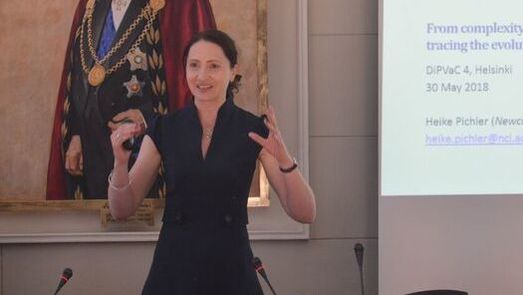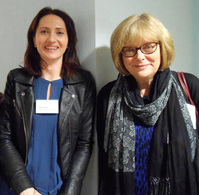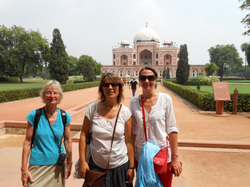2024
- Social predictors of (ing) variation in later life. CLARe 6, University of Tübingen, Germany (with Scarlett Hart, Sophie Krol & Caitlin Halfacre).
- Researching later-life language use: challenges and opportunities. Corpus Linguistics Satellite Online Talks, University of Leeds, UK,.
2023
- Variationist sociolinguistics and verbatim theatre: co-producing entertaining and impactful public engagement. UKLVC 14, University of Edinburgh, UK.
2022
- Using sociolinguistic interviews and verbatim theatre to foster inclusive and age-friendly communities. British Society of Gerontology Annual Conference 2022, University of the West of England, Bristol, UK (with Steve Gilroy).
- EPIC: Exposing and Preventing Effects of the Invisible Curriculum. Learning and Teaching Conference, Newcastle University, UK (with Christine Cuskley, Johannes Heim & Rebecca Woods).
- Stative possessives in later life: we (have) (got) more evidence from Tyneside. CLARe 5, University of Anchorage, Alaska (with Cara Walker).
- Researching discourse-pragmatic features: design and execution. Invited paper at the International Conference on Research Skills for Research Impetus, Vellore Institute of Technology, Chennai, Tamil Nadu, India.
- Performing older Tyneside voices: using research-based drama to de-marginalize older adults' voices. Newcastle Medical Humanities network, Newcastle University, UK.
2021
- Orthographic variation reflects constituency variation, am I right or amirite? DiPVaC 5, University of Melbourne, Australia (with Marisa Brook).
- Predictors of discourse-pragmatic variation in later life, you know. DiPVaC 5, Univeristy of Melbourne, Australia.
- Exploring discourse-pragmatic variation in computer-mediated communication, <amirite>. Plenary presentation at the International Conference for the Department of Linguistics, University of Bucharest, Romania.
- Predictors of sociolinguistic variation in later life. UKLVC 13, University of Glasgow, UK (with Rebecca Thorpe).
2020
- The challenges of testing contact hypotheses in discourse-pragmatic change. Humboldt University, Berlin, Germany.
- Observing the course of discourse-pragmatic change in synchronic data. Sociolinguistics Series, Leiden University Centre for Linguistics, The Netherlands.
2019
- Talking with & about older adults. Workshop for volunteer carers, Northumbria Healthcare NHS Foundation Trust, Newcastle upon Tyne, UK.
- The interaction of internal and external factors in a discourse-pragmatic change. University of Potsdam, Germany.
- Sex, drugs and utterance-final tags in adolescent narratives of personal experience. UKLVC 12, London, UK.
- ‘This is what happened, right?’: sex differences in narrative tagging. LVC research group, University of Toronto, Canada.
- Category change in thetical grammar, innit. Linguistics & English Language research seminar series, University of Manchester, UK.
2018
- Using corpora to probe shared grammatical constraints: evidence from restrictive relativization. ICAME 39, Tampere, Finland (with Stephen Levey).
- From complexity to uniformity, via (contact-induced) grammaticalization: tracing the evolution of the London question tag ‘system’. Plenary presentation at DiPVaC 4, Helsinki, Finland.
- Fuzzy categories and category boundaries, innit. Plenary presentation at DiscourseNet 20, Budapest, Hungary.
- PG buddies: supporting transitions and building communities. Education for Life, Newcastle University, UK (with Joey Jenkins, Jasmine Warburton & Kaleigh Woolford).
Talking about my favourite word, innit, at DiPVaC 4, Helsinki, May 2018 (photo courtesy of Kashif Malik).
2017
- A cross-varietal perspective on variation and change in restrictive relativization: evidence from Britain and Canada. UKLVC 11, Cardiff, UK (with Stephen Levey).
- Revisiting transatlantic relatives: evidence from British and Canadian English. Methods XVI, Tachikawa, Tokyo, Japan (with Stephen Levey).
- Because vigorous grammaticalization, innit: the new tag question 'system' of MLE. University of Edinburgh, UK (with Eivind Torgersen).
2016
- Social and cognitive effects on old-age language use. Institute of Neuroscience, Newcastle University, UK.
- The multiple variables of innit: achieving full accountability in discourse-pragmatic variation and change research. DiPVaC 3, University of Ottawa, Canada.
2015
- The language of dementia: applying sociolinguistic methods to issues in assessing and treating cognitive impairment. Workshop given at ICCH 13, New Orleans, Louisiana, USA (with A. Hesson).
- The devil is in the detail: interpreting I don't know in Mini Mental State Exams. ICCH 13, New Orleans, Louisiana, USA (with A. Hesson). [This presentation was short-listed (out of 600+ submissions) for the Best Paper Award and was commissioned for publication in Patient, Education and Counseling 99(9).]
- Innit and its variable contexts: re-defining the variable (context) for full accountability. Panel on 'Pragmatic variation and pragmatic variables' (organised by K. Schneider & A. Jucker), IPrA 14, Antwerp, Belgium.
2014
- Novel impact pathways in variationist linguistics: learning for and from specific societal contexts. Panel organised for NWAV 43, Chicago, Illinois, USA (with A. Hesson).
- Discourse-pragmatic variation in healthcare settings: form-function correlations in the use of I DON’T KNOW. NWAV 43, Chicago, Illinois (with A. Hesson).
- Innit and its variable contexts: discourse-pragmatic innovations in Multicultural London English. Michigan State University, Michigan, USA..
- Uncovering hidden stories: interpretation of I DON'T KNOW as an interactional strategy in pediatric mental health consultations. AACH Research & Teaching Forum 2014, Orlando, Florida, USA (with A. Hesson).
- Quantitative discourse variation analysis. Invited workshop given at the Doctoral programme Studies in Language and Society, University of Bern, Switzerland.
- Exploring novel impact pathways in variationist research: discourse variation in health-care settings. Workshop given at DiPVaC 2, Newcastle University, UK (with A. Hesson).
- Unstable peripheries, innit? Functional & syntactic changes in the London question tag system. DiPVaC 2, Newcastle University, UK.
with Jenny Cheshire at DiPVaC 2, Newcastle upon Tyne, April 2014 (photo courtesy of Claire Childs)
2013
- Discourse function and clause periphery, innit? Panel on 'The pragmatic role of elements at the right periphery' (organised by L. Degand & E. Traugott), IPrA 13, New Delhi, India.
- Question tags in contemporary London English: variation and innovation. Panel on 'The role of identity in discourse-pragmatic variation and change' (organised by K. Beeching), i-mean 3, University of West of England, UK (with E. Torgersen).
2012
- Recent innovations in the use of innit: views from Multicultural London. ICAME 33, University of Leuven, Belgium (with E. Torgersen).
2011
- Discourse-pragmatic variation & change: implications for linguistic theory. Plenary presentation, CLP 20, University of Manchester, UK.
- Formulaic collocations: interfacing variationist sociolinguistics and grammaticalization theory. Institute for Language & Communication, University of Louvain-la-Neuve, Belgium.
- Formulaic collocations and linguistic structure. Lingforum, Ghent University, Belgium.
- Collocations in linguistic variation & change: negative periphrastic do and its environs. Centre for Linguistics & Applied Linguistics, University of Salford, UK.
- Discourse variation & linguistic theory: overcoming the obstacles. Applied Linguistics Circle, University of Reading, UK.
2010
- Tracking grammaticalization in synchronic dialect data: general extenders in north-east England. Language Variation and Linguistic Theory, University of Lancaster, UK (with S. Levey).
- Discourse variation analysis: challenges for the future. Institute for Linguistics and Language Studies, University of Manchester, UK.
- A variationist perspective on the grammaticalization of general extenders in north-east England. Langwidge Sandwidge, University of Manchester, UK (with S. Levey).
- Discourse variation analysis: challenges for the future. Linguistics Lunch, University of Oxford, UK.
- Discourse variation analysis: what it is and why it matters. University of Edinburgh, UK.
- ‘I mean, just like the words we combine and that’: variability in discourse collocations. ICAME 31, University of Giessen, Germany (with S. Levey).
before 2010
- see my CV for details
[last up-dated: 06 April 2024.]


